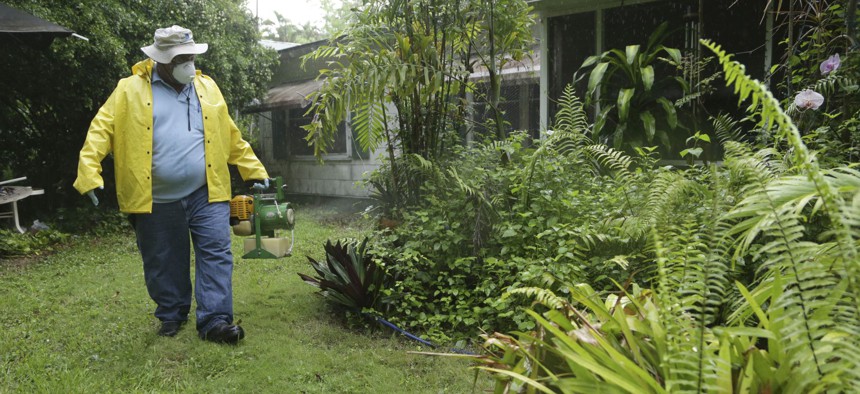Number of Zika Cases Likely From Florida Mosquitoes Rise to 14

Robert Muxo, of the Miami-Dade County Mosquito Control department, sprays for mosquitoes, Tuesday, June 21, 2016, in Miami. Lynne Sladky / AP Photo
Ten new cases were confirmed in the state on Monday.
(This story was updated at 6:30 p.m. on Monday to include new information from the U.S. Centers for Disease Control and Prevention)
Florida health authorities have identified 10 new cases of Zika virus thought to have originated with mosquitoes near downtown Miami, Gov. Rick Scott said Monday, bringing the total number of people believed to have caught the disease from mosquitoes in the state to 14.
The cases are the first involving people suspected of becoming infected with Zika from mosquitoes in the mainland U.S. Scott asked the U.S. Centers for Disease Control and Prevention to activate an emergency response team to assist the state in its efforts to investigate and combat the virus. The CDC later granted that request.
Health officials in Florida believe the insects responsible for spreading the virus are confined to an area north of downtown Miami. It is roughly one square-mile and covers a neighborhood called Wynwood.
Among other recommended precautions, the CDC is advising women who are pregnant to avoid this area. The agency also says that pregnant women who visited there on or after June 15, 2016 should get tested for Zika.
Tourism is an important part of Florida’s economy. Scott noted Monday that the state has already seen 30 million tourists this year. But the increasing number of Zika infections raises the specter that people might become wary of visiting the Sunshine State.
On Monday, the governor sought to reassure residents and visitors that the state government was on top of the evolving Zika situation.
“Florida has a proven track record of success when it comes to managing similar mosquito-borne viruses,” he said in a statement. “We will continue to keep our residents and visitors safe utilizing constant surveillance and aggressive strategies, such as increased mosquito spraying, that have allowed our state to fight similar viruses.”
Zika can be spread by mosquito bites, through sex, or from a pregnant woman to her fetus.
For many people Zika symptoms—such as fevers, rashes and headaches—are mild, or go without notice.
But if pregnant women contract the virus it can cause severe birth defects for their babies, including microcephaly, a condition where a child’s head is smaller than normal.
Zika transmission from mosquito bites has occurred previously in dozens of countries throughout Central and South America.
Of the 14 Florida cases, 12 involve men and two involve women, according to Scott's office. The governor's office did not specify if the women were pregnant. The initial four cases thought to have resulted from mosquito bites near Miami were confirmed last Friday.
The CDC said Monday it had two team members on the ground in Florida, and that three more would arrive there later in the day, along with three others on Tuesday.
Florida health department figures published last Friday showed the state had recorded 386 travel-related cases of Zika that originated outside of the U.S. Of these, 55 involved pregnant women. The first travel-related case in the state emerged in February.
As of last Wednesday, 1,658 cases of Zika had been reported to the CDC in the mainland U.S. and Hawaii. But none of these had resulted from local mosquito bites.
The agency has released a document meant to help guide state, local and tribal agencies as they approach communication efforts and community engagement tied to the virus.
According to the CDC, no vaccine exists that can prevent a Zika infection.
Bill Lucia is a Reporter for Government Executive’s Route Fifty and is based in Washington, D.C.
NEXT STORY: Training Program Gives Cash-Strapped R.I. Municipalities Some Hope






